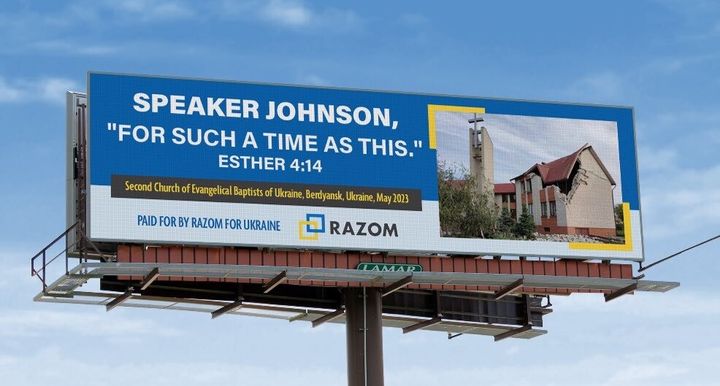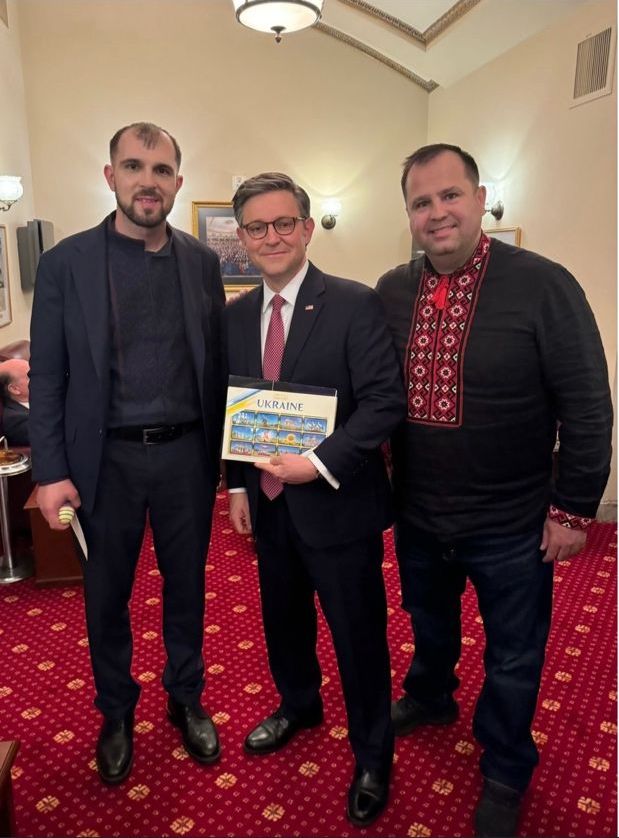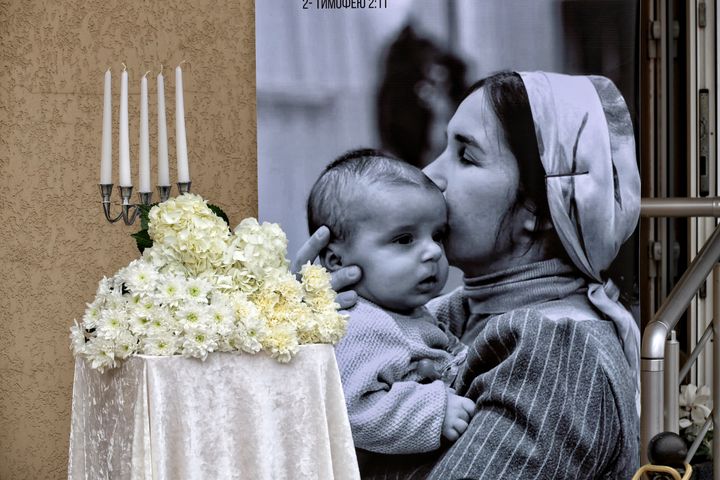In Shreveport, Louisiana, across the street from House Speaker Mike Johnson’s hometown church, an unusual billboard would pop up occasionally.
During weeks when Congress was out of session and Johnson was home, it showed a picture of a bombed-out church in the southeastern Ukraine city of Berdyansk, next to a caption: “Speaker Johnson, ‘For a time such as this.’ Esther 4:14.”
While the debate raged in Washington over whether to approve another round of aid to Ukraine or pair it with an immigration overhaul, the billboard ― part of a campaign to remind Johnson of the price his fellow evangelical Christians were paying for American inaction ― stood as a mute reminder to Johnson, a Southern Baptist.

The inaction lasted for six months, only ending after President Joe Biden signed a law Wednesday giving Ukraine $60.8 billion in additional aid that passed Congress only days before.
Over the half-year time frame, advocates for Ukraine made argument after argument aiming to sway Republicans like Johnson: Inaction would reward Russia President Vladimir Putin and embolden other enemies of the U.S. Sending the weapons would reboot the industrial base needed to supply our own military. The U.S. owed it to Ukrainians who gave up their nuclear weapons in 1994, at the behest of the United States.
But the arguments appeared to make little impact on Johnson, who insisted on linking aid and border security until about two weeks ago.
Two pro-Ukraine groups, the Ukraine Project Freedom and Razom for Ukraine, settled on a much narrower, and ultimately maybe more potent, argument ― arguing Russian invaders were systematically and intentionally destroying churches belonging to evangelical Christians.
It’s not clear how much the argument worked. Johnson’s office declined to comment, and Johnson himself listed several reasons he changed his mind and decided to allow a vote on Ukraine aid when he spoke to reporters April 17.
But on the day Johnson made it clear he would hold the vote, even if it cost him his job as the most powerful Republican in Washington, he met with two Ukrainian evangelicals, including one who had lost his wife and 4-month-old son only weeks before to a Russian air attack.
“The responsibility of the free world was placed upon the shoulders of America after World War II,” Johnson told reporters. “We have to be the beacon of light and we have to show strength.”
Johnson’s words were music to the ears of Ukraine supporters who had worked for months to get the aid package unstuck. But they also contained echoes of the Old Testament story of Esther, a Jew who was picked to be the wife of the Persian King Xerxes at a time when the Jews were in captivity.
Esther, according to the story, kept her heritage a secret until Mordecai, the man who took care of the orphaned Esther when she was young, told her of a plan by one of Xerxes’ advisors to kill all the Jews. He asked her to intercede with Xerxes on their behalf, even though it could mean her death.
“Who knoweth whether thou art come to the kingdom for such a time as this?” Mordecai said to the reluctant Esther. She eventually talked to Xerxes, who stopped the plan to kill all the Jews, and hung the advisor.
“Someone who is close to Johnson told me he is animated by the story of Esther,” said Steven Moore, the founder of the Ukraine Freedom Project, which helps get aid, medical supplies and food to frontline areas.
Johnson was seen as an almost accidental speaker after he came from backbench obscurity in October to replace ousted former Speaker Kevin McCarthy. His tenure has been marked by constant threats of a similar removal by party hardliners over spending, U.S. spying laws and Ukraine.
But Johnson has persevered and his stock may be rising after the Ukraine vote, which saw the package supported by 311 House members, though only a slight minority in his own party.
He has worn his faith on his sleeve, saying when he took the gavel there was an easy way to try to divine his views on specific issues. “Go pick up a Bible off your shelf and read it ― that’s my worldview,” he said two days after he was elected speaker.
Johnson’s activism in conservative Christian circles also meant he could be exposed to the stories of what was happening in Ukraine, whose two main religious traditions are Orthodox Christianity and Catholicism.
Pavlo Unguryan, a former parliament member and a Baptist evangelical leader in Kyiv, told HuffPost he has known Johnson for some time from the prayer breakfast movement. The initiative, to have public officials gather regularly for religious fellowship, is a project of The International Foundation, a secretive group of conservative evangelicals better known as “The Family.” Unguryan saw Johnson in February, during a prayer breakfast at the Museum of the Bible in Washington.
“Johnson is a great, great Christian. And we know his wonderful story from his church, from his family. And he’s [an] amazing servant of God,” Unguryan said.

Unguryan said in 2014, before Russia took over the Ukrainian peninsula of Crimea, there were about 11,000 evangelical churches in the country, with about 3,000 of them being Baptist.
But those numbers have dropped since the full-scale invasion started in February 2022, in part, Unguryan said, because Russians see evangelicals as Western and potential spies.
“Russia disproportionately targets Protestant Christians. Protestants make up about 4% of the Ukrainian population, but they comprise more than a third of the documented incidents of Russian persecution,” said Melinda Haring, a senior advisor for Razom, in an email.
“Baptists are hard hit. The Ukrainian Baptist Theological Seminary reports the loss of some 400 Baptist congregations since the beginning of the full-scale Russian invasion.”
Moore said he’s shown members of Congress video of Russian troops entering an evangelical church in occupied Melitopol, telling the congregation to stay seated so their presence could be documented, and that they would be fingerprinted and have their phones searched.
Ukraine’s small evangelical community also took a hit March 2 when the port city of Odesa was attacked with drones. A drone hit by air defense fell on a nine-story apartment building, causing part of it to collapse and killing 12 people.
Among the dead were 4-month-old Timofii Haidarzhy and his mother, Anna, 31. She was the daughter of a prominent local evangelical church minister and the attack, which killed four other children, made headlines across the country.
“It was an absolutely big tragedy for many people and people share the pictures of the mom and her baby,” Unguryan said.
The father, Serhii, was in another room with the couple’s daughter and survived. He and Unguryan, on a trip paid for by both Ukraine Freedom Project and Razom, met with Johnson on April 17, the day Johnson said he was willing to risk being booted from being speaker for allowing a vote on Ukraine.

“It was not a long conversation,” Unguryan said, estimating the meeting only took seven to 10 minutes. Haidarzhy showed Johnson some pictures of his dead son and a piece of the Iranian drone that hit his building, Unguryan said, noting similar drones had struck Israel only days before the meeting.
Johnson was moved.
“He just stay and pray and want to encourage [Serhii]. It was like a real conversation, in one spirit,” Unguryan said. “It was a great blessing to have some minutes.”
Later that day, Johnson told reporters he believed Russia, Iran and China were working in coordination as an “axis of evil.”
“We have to do the right thing and history will judge us,” he said.
Disclaimer: The copyright of this article belongs to the original author. Reposting this article is solely for the purpose of information dissemination and does not constitute any investment advice. If there is any infringement, please contact us immediately. We will make corrections or deletions as necessary. Thank you.
